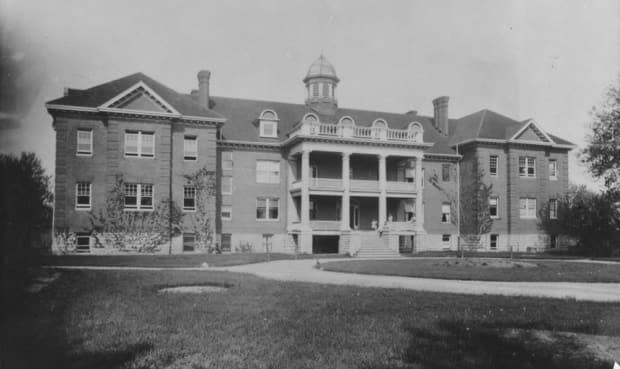Ontario pledging $10M to identify and commemorate residential school burial sites

WARNING: This story contains details some readers may find distressing.
The provincial government is earmarking $10 million in funding over a three-year span to identify, investigate and commemorate residential school burial sites in Ontario, Premier Doug Ford announced at a Tuesday morning news conference.
The announcement comes amid growing calls from Indigenous communities for funding and logistical support to search the properties of former residential schools for the unmarked graves of children forced to attend the institutions.
Ogichidaa Francis Kavanaugh, grand chief of the First Nations in Treaty 3 territory in northwestern Ontario and Manitoba, acknowledged the province's pledge, and said recent news around residential schools in Canada has reopened old wounds for Indigenous people.
"Truth be told, it has impacted every First Nation member throughout this land we call Canada," he said.
Some might call what happened in residential schools "cultural genocide," Kavanaugh said — but the reality is even more horrific.
"For us, it's genocide. That's what took place. They wanted to wipe us out," he said.
WATCH | Treaty 3 grand chief speaks about residential school burial sites:
Late last month, Tk'emlúps te Secwépemc First Nation in British Columbia revealed that preliminary results from a survey of the grounds at the former Kamloops Indian Residential School — at one time Canada's largest — indicate the remains of more than 200 children could be buried at the site.
The disturbing discovery sparked a national outcry and demands for Canada, its governments and its non-Indigenous residents to finally reckon with the dark legacy of residential schools and the lasting trauma they inflicted on generations of Indigenous people.
"There is painful but necessary work ahead, and we must confront what happened for reconciliation to be achieved," Ford said.
Search efforts will be community-led, province says
The new funding will also go toward ensuring "culturally appropriate, trauma-informed mental health supports are available for Indian Residential School survivors, their families and Indigenous communities," officials said in a news release.
Ontario's Minister of Indigenous Affairs, Greg Rickford, said Tuesday that it is critical that any search and recovery efforts are community-led.
"Each phase of this work must be, and will be, guided by Indigenous communities," Rickford said.
WATCH | Other First Nations aim to locate unmarked graves after Kamloops, B.C., discovery:
The province says it will identify experts like archaeologists, forensic specialists and historians to lead the related research, analysis and technical field work required to make sure the work will be "conducted to the highest standard."
Sol Mamakwa, NDP MPP for Kiiwetinoong, said Tuesday that $10 million is an "insignificant" amount considering the work that needs to be done.
"When we talk about 18 residential schools … in Ontario, $10 million over three years is a drop in a bucket," he said.
"We welcome it, but I hope it's just only the beginning."
According to a provincial press release, the Truth and Reconciliation Commission (TRC) estimates that at least 426 children who attended residential schools in Ontario are known to have died, while an unknown number are still missing.
The TRC research has identified 12 locations of unmarked burial sites in Ontario, but there are likely more, officials say.
"There's going to be more remains found," Kavanaugh said. There were 18 residential schools in Ontario, with the last one closing in 1991, according to the province. Some sites have since been repurposed, abandoned or destroyed.
Prioritizing justice
The federal government has set aside $27.1 million to assist Indigenous communities in identifying unmarked burial sites at former residential schools.
Six Nations of the Grand River in Ontario has asked for more than a third of that funding to search for possible remains of children on the grounds of the former Mohawk Institute Residential School.
Chief Mark Hill said it's a substantial, but necessary, request to conduct a full investigation.
Speaking at Tuesday's news conference, Hill said people in Six Nations are still "haunted by intergenerational wounds," and justice must be sought.
"We cannot skip justice and go straight to commemoration," Hill said. "Commemoration is important, but that is not why we are here today."
The intent of residential schools was clear, Hill said: "To change us, to make us other than who we are."
Though it was not represented at Tuesday's press conference, there were also calls for the Catholic Church to be involved in the reconciliation process.
Rickford said he believes the church should "become an integral part of this process to the extent of their involvement."
WATCH | Minister of Indigenous Services Greg Rickford speaks to CBC's Power & Politics:
While Pope Francis has expressed "closeness to traumatized Canadians" over the discovery in B.C., much more is needed, Kavanaugh said.
"I believe that the Catholic Church needs to come forward and make efforts to bring the Pope to Canada for a formal apology to all First Nations across Canada," Kavanaugh said.
The news from Kamloops also intensified a pressure campaign for Ryerson University in Toronto to change its name. Egerton Ryerson, for whom the school is named, is considered a primary architect of the residential school system in Canada.
After a demonstration in support of residential school survivors earlier this month, the statue of Ryerson that stood on the school's campus was toppled, its head severed and put on a spike at the 1492 Land Back Lane protest site in Caledonia, Ont.
Support is available for anyone affected by their experience at residential schools and those who are triggered by the latest reports.
A national Indian Residential School Crisis Line has been set up to provide support for former students and those affected. People can access emotional and crisis referral services by calling the 24-hour national crisis line: 1-866-925-4419.

 Yahoo Finance
Yahoo Finance 